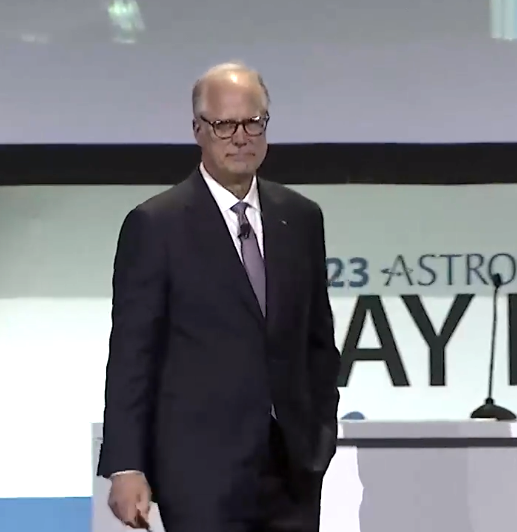Pass It On: Personal Lessons From Patients and Clinical Trials
 Clinical trials not only offer hope and the potential to improve outcomes for those enrolled, but they also play a crucial role in advancing treatment for future patients. A gift that keeps giving, they are a primary example of paying it forward through partnering with patients – the theme of ASTRO 2023 held in San Diego last fall.
Clinical trials not only offer hope and the potential to improve outcomes for those enrolled, but they also play a crucial role in advancing treatment for future patients. A gift that keeps giving, they are a primary example of paying it forward through partnering with patients – the theme of ASTRO 2023 held in San Diego last fall.
In his presidential address “Personal Lessons from Patients and Clinical Trials,” Jeff Machalski, MD, MBA, (pictured left) discussed how standard-of-care treatments result from the efforts of dedicated researchers and patients who take part in studies. He shared lessons he’s learned through his decades-long experience in research, as summarized in his advice to mentor, be humble, be accountable, have grit, be curious, and have courage.
Dr Machalski, the Carlos A. Perez Distinguished Professor of Radiation Oncology at Washington University in St. Louis, where he also serves as vice chair and director of clinical programs and medical director of the Siteman Cancer Network, discussed how his experiences in clinical trial leadership sharpened his focus on ensuring patients receive high-quality care through rigorous quality assurance programs. He also acknowledged the impactful role of mentors and colleagues who recognize potential and help mentees attain it.
“My advice for early career physicians is to listen and act upon the sound advice from your peers and leaders,” he said. “Be kind and generous with your experience.”
Dr Machalski shared an experience of treating a 5-year-old patient with an unresectable paraspinal mass. While reviewing the treatment plan with a visiting fellow, he realized he made an error when transposing the tumor from the CT onto a PA radiograph, leading him to inadvertently treat the patient’s contralateral side. While he reported the protocol deviation to the principal investigator (PI) and took steps to ensure this type of event would never happen again, Dr Machalski said the hardest part was telling the boy’s parents. “I learned what it meant to be humble, and I apologized,” he said.
Dr Machalski also discussed a case that occurred while he was serving as the PI for the radiation therapy portion of a clinical trial. He learned that a child had begun post-radiation chemotherapy and experienced an overdose of magnesium sulfate administered for nephrotoxicity protection. The cause of the 10-fold overdose was a typo in the protocol.
The team drafted an amendment and emergency memo to all investigators, but Dr Machalski went even further. He personally called all the PIs and treating physicians to communicate the error and its remedy. No other reports of overdose were reported, and the child completely recovered. “Be accountable,” he emphasized.
Dr Machalski also spoke about the importance of grit in trial execution amid the common “mid-term lag,” particularly in studies testing technology that require considerable capital investment.
“If the trial is open too soon, you’ll start to see slow accrual because there are just not enough institutions that can participate.” he noted. “But if a trial is proposed after broad adoption … then it’s equally hard to complete the trial.”
Competitive centers may even attempt to pull patients away, offering off-protocol treatment. He explained how in such a case his team pushed forward, addressing barriers to enrollment and enabling significant accrual.
Dr Machalski discussed the importance of maintaining curiosity via continuing to investigate the nature of research findings; for example, by seeking to understand the performance of subgroups.
“Curiosity remains an important motivator to continue discoveries that will improve our patient outcomes,” he said. “We owe it to ourselves, our patients, and our specialty’s future to do the hard things.”
Dr Machalski concluded with a call to action for technology assessment trials.
“We must have the courage to conduct studies that randomize new technologies against existing standards of care. This is the most efficient and direct way for us to know if continued investment in these technologies is worth it,” he said, citing proton therapy as an example.
“The number of completed and published randomized studies [on protons] can be counted on your hands,” he said, also calling for payer and Medicare support for clinical trials.
“We have important trials that are suffering from poor accrual or significant participant dropout when insurance companies deny the patient who has been randomized to a newer, sometimes more expensive treatment,” he added. “These denials not only jeopardize the completion of the study but may limit the generalizability of these results to other populations.”
Additionally, trial sponsors must continue to fund research to compare technologies where needed, with support from public and private sources but not overlooking funding from industry and private foundations as well.
“We must have the collective courage to ask these difficult questions and conduct these meaningful studies,” he urged.